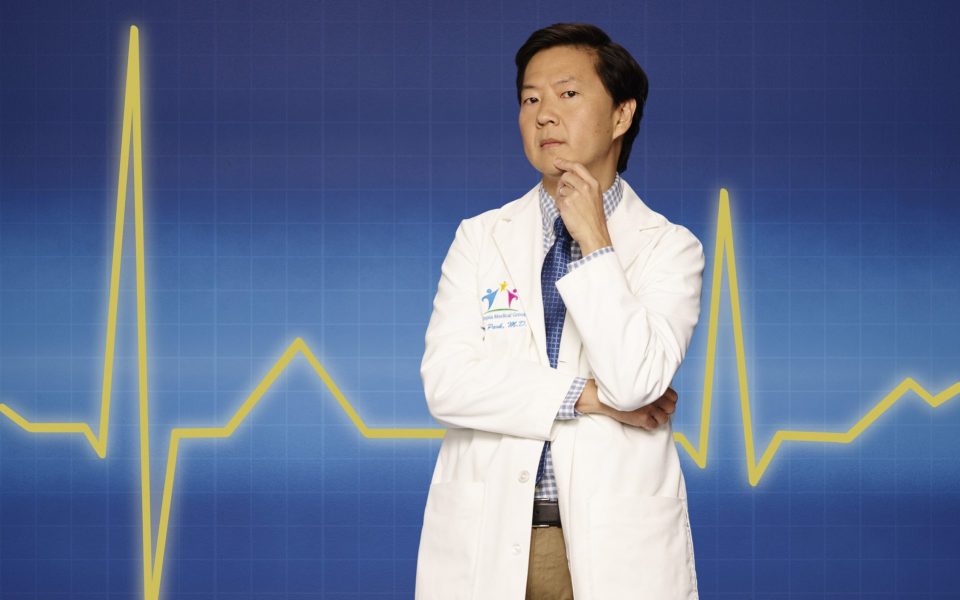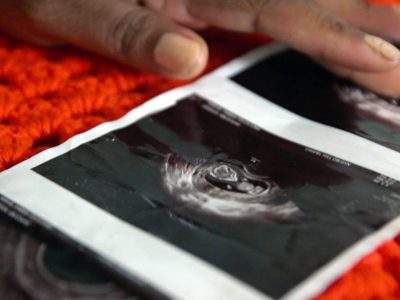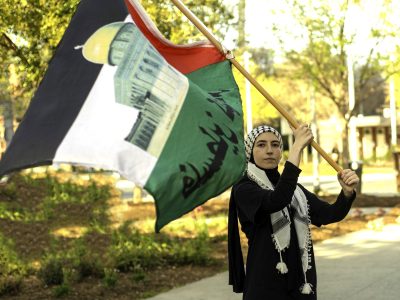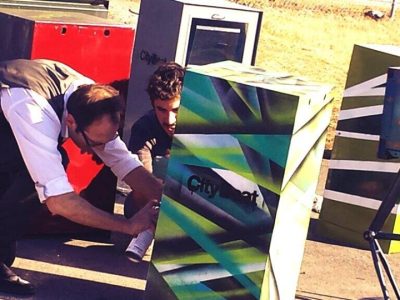The whole school was there — teachers, staff, even the sophomores as well as the entire graduating Class of 1986 at Page High School — and on the stage in front of them all, young Ken Jeong was about to have his first big moment.
Greensboro was different in 1986 — there were 100,000 fewer people, and a significantly smaller Asian population.
“There were not a lot of Asian kids at Page,” Jeong says by phone from a television studio in Los Angeles, where he’s putting the finishing touches on his new TV series “Dr. Ken.” “We had some Chinese and Taiwanese students in my class, but it wasn’t that many.”
He was a senior at the time, though he was just 16 years old, a husky Korean kid who admittedly spent most of his time worrying about getting into a good college. But he was popular in the way brilliant overachievers can be, and drew from a wide circle — he was active in the orchestra and student council, played varsity tennis and competed on the Science Olympiad team, served as president of the Key Club and was named an Outstanding Senior in the 1986 Buccaneer yearbook.
Even back then, Ken Jeong had mass appeal.
That’s probably why he was nominated for Mr. Buccaneer, Page’s annual male beauty pageant.
“I had never performed,” he said. “I was a little chubby kid. And during the swimsuit competition I did, like, a mock bodybuilder pose.
“I got a huge laugh,” he remembers.
Later he would get a standing ovation when he sang “Three Times a Lady” for the talent portion of the competition, and that sealed the deal.
“That,” he says, “was my dynamite moment, if you will.”
 “I was this chubby kid
” data-medium-file=”https://i1.wp.com/triad-city-beat.com/wp-content/uploads/2015/09/yearbook-e1442965479138.jpg?fit=205%2C300&ssl=1″ data-large-file=”https://i1.wp.com/triad-city-beat.com/wp-content/uploads/2015/09/yearbook-e1442965479138.jpg?fit=696%2C631&ssl=1″ data-recalc-dims=”1″>
“I was this chubby kid
” data-medium-file=”https://i1.wp.com/triad-city-beat.com/wp-content/uploads/2015/09/yearbook-e1442965479138.jpg?fit=205%2C300&ssl=1″ data-large-file=”https://i1.wp.com/triad-city-beat.com/wp-content/uploads/2015/09/yearbook-e1442965479138.jpg?fit=696%2C631&ssl=1″ data-recalc-dims=”1″>
©
***
His father taught economics at NC A&T University, and from an early age, education was a priority in the household.
At Rankin Elementary in the 1970s, he tested out of second grade — “I really think I just told my dad I was bored, and I took a test and placed out of it,” he said. “I think I was pushed to excel by my parents, and even without the pressure, I internalized it and put a lot of pressure on myself.”
His success at Page took him to Duke University, where his pursuit of med school met with a small hiccup: He found the drama club. But his father advised him to stick with medicine and pursue comedy on the side.
After completing med school at UNC-Chapel Hill, Jeong went to New Orleans to finish his residency at Ochsner Hospital, where another brush with the funny business nearly took him off course again.
“The Big Easy Laff Off” was a live stand-up competition in New Orleans that combined the tried-and-true stand-up element of shows like “Evening at the Improv” with a game-show component that would become more popular on television in the years to come. Judges included Budd Friedmann, founder of the Improv, and legendary NBC President Brandon Tartikoff. Jeong won with the kind of smart material and self-deprecating humor that would come to define his standup. He took the prize — a trip to LA to perform at the Improv — and set up his medical practice there while honing his act in the clubs.
“I think I was gradually introduced to the big cities,” he says. “[New Orleans] obviously has its unique charms, and that was a good segue to big-time LA. I think I was introduced to big cities in an organic way.”He started landing small parts — the first was Dr. Tang on the TV series “The Big Easy” in 1997 — and by the turn of the century found himself in bigger roles, on bigger shows — “MADtv,” “Two and a Half Men,” “The Office,” “Entourage.” He landed a role in 2008’s The Pineapple Express, directed by UNC School of the Arts alumni David Gordon Green, which led to a featured role in “Community” as angry college professor Ben Chang.
“‘Community,’” he says. “I think it was one of the best sitcoms in the last 10 years. You can’t get any better than that.”
That role overlapped with the premiere of The Hangover, as Asian gangster Mr. Chow. That film would go on to become the most successful adult franchise in box-office history. Jeong couldn’t have known that at the time; he was still practicing medicine in LA. But the opportunities afforded by the exposure from The Hangover lured him away from medicine and into acting full time.
“I miss my patients all the time,” he says. “I still keep in contact with some of them. I don’t miss working holidays and every weekend, but I do miss my patients.”
He also didn’t know he was on the cusp of full-blown stardom.
***
Over the next five years he would lend his talent to some of the biggest projects to hit the screen: Despicable Me, “American Dad,” Transformers: Dark of the Moon, Pain & Gain, Kung Fu Panda: Legends of Awesomeness, “Bob’s Burgers,” “Glee” and his continuing work with “Community,” not to mention the Hangover sequels that further increased his profile. He was everywhere. In a beer commercial from 2013 he referred to himself as “That guy from that thing!”
 “We don’t encourage our kids to be doctors,” Jeong says. “They’ll find something they love to do that we haven’t even thought of.”
” data-medium-file=”https://i0.wp.com/triad-city-beat.com/wp-content/uploads/2015/09/083.jpg?fit=300%2C225&ssl=1″ data-large-file=”https://i0.wp.com/triad-city-beat.com/wp-content/uploads/2015/09/083.jpg?fit=696%2C522&ssl=1″ data-recalc-dims=”1″>
“We don’t encourage our kids to be doctors,” Jeong says. “They’ll find something they love to do that we haven’t even thought of.”
” data-medium-file=”https://i0.wp.com/triad-city-beat.com/wp-content/uploads/2015/09/083.jpg?fit=300%2C225&ssl=1″ data-large-file=”https://i0.wp.com/triad-city-beat.com/wp-content/uploads/2015/09/083.jpg?fit=696%2C522&ssl=1″ data-recalc-dims=”1″>
©
“I didn’t have these delusions of grandeur,” he says. “I was pretty happy on my way up, which I think is why I have been working so long. If I was doing medicine full time and doing standup on the side I would be just as happy.
“I didn’t quit my day job to become famous,” he continues. “I quit so I could act. I was happy being the doctor in Knocked Up. I remember being on ‘The Office’ second season, one line, completely forgettable. I remember every second of that. I wouldn’t be talking to you if it wasn’t for The Hangover. I wouldn’t have ‘Dr. Ken.’ Everything happened because of The Hangover. It was a beautiful moment in my career and has given me all these wonderful opportunities.”
***
For his return to television, Jeong wanted to make something like the old sitcoms he used to watch when he was a student at Page: multicam, filmed in front of a live studio audience like “Cheers,” drawing on influences that range from David Letterman to Eddie Murphy to Garry Shandling.
“Multicam is like putting on a play every week,” he says, “a poorly rehearsed play with a lot of outtakes. That’s what we do on our show. It’s amazing, and my standup instincts are coming together with my years of doing dozens of movies, that dovetails nicely into a live audience situation where I’m bringing in elements from my standup.
“As a performer, everything is coming full circle” he continues. “It’s pretty beautiful.”
He also co-wrote the pilot, co-produces the series and contributes to the story arc.
“This has really been such a dream come true because I’m involved in every facet of production,” he says. “It’s just really gratifying.”
Jeong still comes back to Greensboro to visit his parents, who are still in town — he was here for Mother’s Day and Father’s Day this year — and he only missed his 25th reunion at Page because he was filming The Hangover 2. He sent a video to his classmates.
“I had a great time at Page, man,” he says. “I was a nerd, but I was a popular nerd. I’m not succeeding to spite anybody. I was a happy kid. I was very blessed. I grew up in an environment at Page that was very supportive. I approach everything I do exactly the same way I did when I was a senior at Page: You chop wood, you carry water, you do the work, you tune out the noise, whether it’s a kegger or whatever.”
Join the First Amendment Society, a membership that goes directly to funding TCB‘s newsroom.
We believe that reporting can save the world.
The TCB First Amendment Society recognizes the vital role of a free, unfettered press with a bundling of local experiences designed to build community, and unique engagements with our newsroom that will help you understand, and shape, local journalism’s critical role in uplifting the people in our cities.
All revenue goes directly into the newsroom as reporters’ salaries and freelance commissions.





I had the good fortune to spend some time on the set of Community in 2011/2012. When I met Dr. Jeong I remember telling him I was from Winston-Salem and had gone to college at UNC-G. He was so gracious to talk about the Triad, take photos, and share memories of growing up here. I’m so glad that his career continues to flourish!